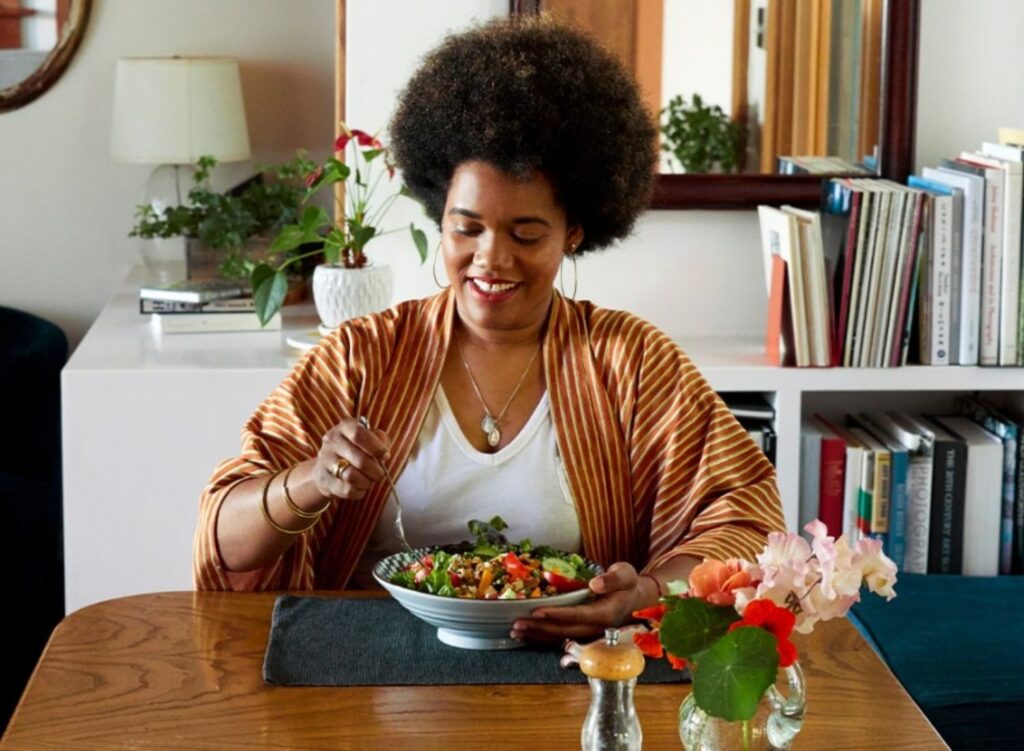A nutritious diet can help boost our immunity and prevent, fight, and help recover any infection, including COVID. In the COVID-19 pandemic, a healthy and nutritious diet is crucial, even boosting a good mood! You need to be aware of what you are eating. This article lists out a few tips for mindful eating during COVID-19.
In this new emerging world, eating healthy, home-cooked food is need of an hour! The word “immunity” is the highlight of whatever we are having in our diets. Lack of a daily routine increases anxiety and disturbed healthy eating habits. One reason for this increase in anxiety is uncertainty, which can throw plans of healthy eating out of the window.
Proper nutrition can also reduce the probability of developing other health problems, including obesity, heart disease, diabetes, etc. Here are some tips for mindful eating during COVID-19.
Tips For Mindful Eating During COVID-19
1. Schedule A Daily Meal Plan

Even though schools, offices are shut down, have a proper dietary routine to keep your meal timings. Fix your meal timings of breakfast, lunch dinner. Make weekends and holidays meal plans ahead, and this will help in having a proper dietary schedule! When you follow this habit, you are in control of what foods you are including. It gives you a view of the foods you are eating.
2. Eat A Variety Of Food

Every day, eat a mix of whole grains like wheat, rice, nachni, legumes like lentils and beans, plenty of fresh fruits and vegetables. Choose whole-grain foods like unprocessed wheat flour and brown rice daily as they are rich in fiber and can help you feel full for a longer time. Use nuts like almonds, walnuts in your diet to provide you healthy mid snacks. Not all nutrients are present in one food. Therefore, it is vital to include various healthy foods in your diet to build immunity.
3. Include Fruits And Vegetables

Choose raw vegetables, fresh fruit as mid meals or as salads. Citrus fruits, oranges, male, and red bell peppers (both rich in vitamin C) help build immunity. One can add spices like ginger, garlic, turmeric, cinnamon; black peppers can be easily added to soups, saar, aamti varan, or sabji which aids in immunity.
Foods rich in zinc include cashews, pumpkin seeds, chia seeds, cocoa powder, etc. Magnesium-rich foods help in feel calmer. Stress can low magnesium levels. Examples are legumes, nuts, seeds, leafy greens, and whole grains.
4. Check Your Salt Intake

Consider salt intake to 1 tsp a day (5 g to 10 g). Hypertensive patients should limit up to 2.5 – 5 g/day. When cooking and preparing foods, use salt sparingly and reduce sauces like soy sauce, tomato sauce, Ajinomoto. Pickles, papads, and chutneys should be used as comfort foods sometimes. Use fresh lime or herbs like mint, ammsul (kokum) to add flavor to the meal.
5. Eat Moderate Fats And Oils Amounts

Use healthy fats such as unsalted nuts in moderate amounts as mid-time snacks instead of chips and nachos. Have omega 3 rich foods, such as flax seeds, chia seeds, and walnuts, with low-fat milk and dairy products. Use skimmed milk powder in vegetable gravy. Soups can increase their nutritional value. The use of fried foods that contain trans-fat should be avoided. Practice cooking methods like steaming or boiling instead of frying food.
6. Avoid Sugar In Your Diet

Avoid sugary drinks like fizzy drinks, packaged fruit juices. Consume milkshakes, energy bars, and sports drinks in limited amounts. Drink fresh fruits instead of sweet snacks, such as cookies. They are healthy choices. Avoid binging on chocolate candies. Use them as comfort foods sometimes in a week, especially for children. Make your own fruit and vegetable juices at home.
7. Hydrate Your Body

Drinking enough fluids is vital at all times, but more in such a COVID situation, drink at least 8-10 glasses of water. It also helps constipated people. Women are more prone to urinary infections. Drinking water can avoid this. It is vital for low blood pressure patients too. Include fluids like tea, coffee, sherbets like lemonade, but take them in moderation. You can drink infused-water drinks. Alcohol doesn’t help with hydration.
8. Limit Alcohol Use

Drinking alcohol does not protect against COVID-19 and can be harmful. Alcohol consumption increases health concerns, as well as causing a longer-term effect on the liver, lead to cancer, heart disease, and mental illness. There is no safe level of alcohol consumption. Avoiding such pandemics is useful.
9. Food Portions Are Important

Small portions can limit the intake and avoid overeating. Physical activity is down, and overeating can lead to weight gain. Use the food plate method in which 1/2 plate is of vegetables: 1/4th carbohydrates or cereal, 1/4th protein, and 150-200 ml skimmed milk.







